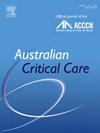儿科重症监护室护士实施腹压测量的障碍和促进因素:定性研究。
IF 2.6
3区 医学
Q2 CRITICAL CARE MEDICINE
引用次数: 0
摘要
背景:腹腔内高血压已被证实是危重病人死亡的独立危险因素。准确监测腹腔内压力对早期识别和及时干预腹腔内高血压以防止进一步发展为腹腔隔室综合征具有重要意义。儿科重症监护护士在持续观察和识别重症患儿腹内压的细微和动态变化方面发挥着重要作用:本研究旨在探讨儿科危重症护理护士对临床实践中腹腔内压力测量的障碍和促进因素的看法:方法:在中国一家三甲医院的儿科重症监护病房开展了一项定性、开放式和探索性研究。对参与腹内压管理的护士和护理管理人员进行了半结构化访谈。访谈指南是根据理论领域框架制定的,旨在探讨在儿科重症监护病房进行腹内压测量的障碍和促进因素。数据分析采用框架方法,借鉴了理论领域框架:我们对 14 名参与者(10 名护士和 4 名护理经理)进行了访谈。我们确定了与腹内压测量相关的七个领域,并将其映射为六个 "障碍 "领域和四个 "促进 "领域。六个 "障碍 "领域是知识、社会影响、行为调节、后果信念、能力信念以及环境背景和资源,四个 "促进 "领域是社会影响、后果信念、环境背景和资源以及社会/专业角色和身份:研究结果证实,有必要采取干预措施来支持儿科重症监护护士的腹内压测量实践,尤其要注重增加知识、改进技能和测量设备、促进护士与医生的跨专业合作、提供标准化测量流程以及建立支持性环境。使用理论领域框架将有助于设计有针对性的干预措施,从而促进儿科重症监护病房腹内压的标准化管理。本文章由计算机程序翻译,如有差异,请以英文原文为准。
Barriers and facilitators in implementing intra-abdominal pressure measurement by nurses in paediatric intensive care units: A qualitative study
Background
Intra-abdominal hypertension has been proven to be an independent risk factor for death in critically ill patients. Accurate monitoring of intra-abdominal pressure is of great significance for early identification and timely intervention of intra-abdominal hypertension to prevent further progression to abdominal compartment syndrome. Paediatric critical care nurses play an important role in constant observation and recognition of subtle and dynamic changes in intra-abdominal pressure of critically ill children.
Objectives
The objective of this study was to explore paediatric critical care nurses's views on the barriers and facilitators in clinical practice of intra-abdominal pressure measurement.
Methods
A qualitative, open-ended, and exploratory study was conducted in the paediatric intensive care unit of a tertiary hospital in China. Semistructured interviews were conducted with nurses and nursing managers who were involved in the management of intra-abdominal pressure. The interview guide was developed using the Theoretical Domains Framework to explore the barriers and facilitators to intra-abdominal pressure measurement in the paediatric intensive care unit. Data analysis followed the framework approach, drawing on the Theoretical Domains Framework.
Results
Fourteen participants (10 nurses and four nursing managers) were interviewed. We identified seven domains related to intra-abdominal pressure measurement mapping to six “barrier” domains and four “facilitator” domains. The six “barrier” domains were knowledge, social influences, behavioural regulation, beliefs about consequences, beliefs about capabilities, and environmental context and resources, and the four “facilitator” domains were social influences, beliefs about consequences, environmental context and resources, and social/professional role and identity.
Conclusions
The findings confirm the need for interventions to support paediatric critical care nurses in their intra-abdominal pressure measurement practices, with a particular focus on increasing knowledge, improving skills and measurement equipment, promoting nurse–physician interprofessional collaboration, providing a standardised measurement process, and establishing a supportive environment. Using the Theoretical Domains Framework will enhance the design of a targeted intervention, which should facilitate the standardised management of intra-abdominal pressure in the paediatric intensive care unit.
求助全文
通过发布文献求助,成功后即可免费获取论文全文。
去求助
来源期刊

Australian Critical Care
NURSING-NURSING
CiteScore
4.90
自引率
9.10%
发文量
148
审稿时长
>12 weeks
期刊介绍:
Australian Critical Care is the official journal of the Australian College of Critical Care Nurses (ACCCN). It is a bi-monthly peer-reviewed journal, providing clinically relevant research, reviews and articles of interest to the critical care community. Australian Critical Care publishes peer-reviewed scholarly papers that report research findings, research-based reviews, discussion papers and commentaries which are of interest to an international readership of critical care practitioners, educators, administrators and researchers. Interprofessional articles are welcomed.
 求助内容:
求助内容: 应助结果提醒方式:
应助结果提醒方式:


